- Home
- Andy Remic
The White Towers Page 2
The White Towers Read online
Page 2
Maybe he was drowning? He did not care. At least the water was ice cold. Chilling him to the bone.
Anything but fire. Anything but the heat.
He shuddered.
Dek. Dek, the bastard. It had been a trap. Lantern oil. Mother’s house. Trapped, with other members of the Red Thumb Gangs…
He fell swiftly down. Into darkness.
He knew he would die.
There came… a shaking.
“Agathe! Agathe! Come quickly!” Hands on him, instant agony, and a muttering, a woman’s voice but gravelled and croaking. “Oh, by the Sweet Mother, oh my word, oh my God! What have we here? What’s happened to you, poor boy? Oh my word! AGATHE!”
“What is it, what is it?” The grumbling of an old crone.
“Come quickly, there’s a poor young man here!”
“Oh my, what happened?”
“I don’t know, here, help me lift him. Oh my poor back, I can’t do this, go and get the cart and be swift about it!”
Words whispered into his ear. “You hold on, you poor, poor man. Don’t you dare let go. We’ll look after you now. I’m Grace, that was my sister Agathe, she’ll bring the pony and cart. Don’t you worry about a thing.”
The clop of hooves. Every jolt made him scream and the pain returned in great pulsing waves as his hands clawed, nails scratching at the wooden boards. He felt an incisor snap as his teeth ground together. He tried to weep, but nothing came, and he panted in frustration, and wished with all his heart that he were dead.
A smell. Sweetness. Honey. And something else. Almost like… cream. And blackberries. Slowly, gradually, finally, coolness crept over him. He was aware of no movement, no sound, no vision, just that beautiful sweet smell, and that gradual enveloping coolness. Eventually, hearing seemed to return, with various cracks and pops, and a feeling of pressure released inside his head. He worked his jaw from side to side and his whole face felt odd, solid almost, like he wore a mask that had been glued to him. He lifted his hand to explore, but heard a tut, a “Hush, what’re you doing?”, and his hand was guided away.
His eyes flickered open.
Two old women stood, gazing down at him. One was holding a large tub in frail, wrinkled hands; the other a wooden spatula.
“Ahh, he’s awake. What’re you called, boy?”
“I…” But he could not speak.
“Ahh, lost for words. But don’t worry. We’ll look after you. We’ll take care of you. Been in a fire, you have. Oh, but I’m losing my manners, my name is Grace, and this is my sister, Agathe. But then, I think I already told you that. It’s been all hands on deck since we found you. Burned, you were. Lying in the stream. Brought you back here on our cart, we did. Boy, you’re a heavy young man! You were wearing chainmail that had almost become a part of you, thanks to the fire. We had to sedate you and use a blunt knife to prize each ring from your flesh.”
“Grace! He won’t be wanting to know that, now.”
“Yes, yes, sorry. How do you feel? You must feel terrible. We’ve made an unguent from various ingredients, it will cool your skin, and draw any bad pus from the open flesh. Oh look, Agathe, he’s trying to speak again.”
“He’ll need water, Grace. Give the poor boy some water.”
Grace took a small cup and held it to his lips. He drank. It was, in all truth, the most incredible thing he had ever tasted. No wine, or ale, or sweet fruit juice could ever compare to that first conscious drink of pure, cool, soothing water.
He spluttered, and Grace removed the cup.
“Thank you,” he croaked.
“What’s your name, boy?”
“I…” and he realised he could not remember. So he licked his cracked open lips, and instead, said, “Thank you. Agathe. Grace. For rescuing. Me.”
“Do you remember what happened?”
“There was a fire.”
“You don’t say, young man!” smiled Grace.
Agathe kicked her, and Grace scowled, bending to rub her ankle.
He drank more water, but still his tongue was made of old oak, still his mouth rinsed with ash. As he licked his lips, he wondered if the taste of fire would ever go away.
“Do you remember anything else?”
He remembered men with swords, firelight glimmering on polished blades. He remembered Dek, the large pit-fighter with iron-dark eyes, and talk of the money he owed to the Red Thumb Gang. But he said nothing. If these old ladies heard talk of warriors and gangs, they might not be so keen to nurse him back to health. If indeed, he could be nursed back to health.
“No,” he finally managed. “Need. To sleep.”
“Of course, dear. Of course.”
Again, his face felt tight, odd, and he tried to lift his hand. Grace stopped him, gently, and returned his clawed, blackened appendage to the white cotton sheets. “No, no, young man. We have placed linen gauze over most of your face. It keeps the cream in place, keeps your skin moist. We’re going to wrap you up pretty well. We’ve dealt with burns before. We know what we’re doing.”
“How?”
“Agathe here used to be a nurse in the city hospital. In Vagan.”
“Oh. That’s… good. Sleep… now.”
Grace patted his hand. “Yes, you poor, poor man. You get some much needed rest.”
Salvond sat high in the tree. It was a fabulous tree, an ancient oak, gnarled and twisted and… Salvond closed his eyes for a few moments. Nigh on four hundred years old. A section was blackened from a previous lightning strike, maybe a hundred years previous, and once more, closing his eyes Salvond felt himself sink into the bark, through the cambium, through sapwood and finally into the heartwood. He felt the slow beat of the tree’s heart, its soul. And he relived the lightning strike, a series of feelings that linked to form a memory. And Salvond soothed the ancient oak. Sent his own pulses through heartwood, through sapwood, and he felt the oak respond to him, acknowledging him, accepting him.
Slowly, he opened his eyes. The two old women were pulling the blackened, tortured man from the pool and man-handling him, with curses and creaks, into a low wooden cart. Salvond remained perfectly still, his own skin – like bark – blending perfectly into the oak which had accepted him, made him its own. Slowly, Salvond’s outer cells shifted, mutated, more and more until he was perfectly invisible against the oak. Only his black eyes could be seen. And the red of his mouth when he licked bark-rough lips.
The two women pulled the cart to their cottage nearby. Salvond listened and, through the sap, through the run of water through the soil, through tiny vibrations bounced from singing birds and clicking insects, he heard their dialogue.
Finally, night fell: a gradual, settling cloak.
There came a crunch as Salvond leapt from the oak and landed in the snow, awkwardly, his twisted back, his different-length legs, one rigid and straight, one with two supple knee joints, all combining to make him crooked and disjointed. Salvond hobbled through the snow towards the cottage, slowly, his bark-like skin masking him in the darkness, his thick, wiry, grey-green hair like so much gorse and bramble.
He slowed by the window. Inside, the glow of an oil lantern illuminated the blackened man in a bed of white cotton sheets, his visible arms and face covered in cream and gauzes, the two old women chatting to him amiably.
Salvond sent out quests. They emerged from his toes, growing through the soil, easing through tiny cracks in the brickwork and the old, porous foundations of the cottage. It took hours. Like roots, questing for water. Only these roots required a different currency; they sought knowledge. They quested into joists, then through the wood of the wide, warped, woodworm-infested floorboards. Finally, they oozed into the very wooden legs of the bed, pushing upwards into the down mattress and finally, into the–
Man.
Crowe tossed and turned beneath the sheets.
Images flickered in Salvond’s mind as he moved backwards through this man’s life, witnessing the fights and the stabbings, the money extortion for the Re
d Thumb Gangs in Zanne; the beatings and murders and the rapes. Salvond came to Crowe’s initiation into the Red Thumbs, and experienced how the hard, mercenary, ambitious young man had turned on his best friend, stabbing him with a black-bladed dagger, quite literally, in the back. Blood on his hands. Again, back through time. Back. An alcoholic father. A weary, worn, beaten down mother who also, finally, turned to the cheap and nasty gin. Running free as a wild child. Wild, and wicked, and unchecked.
Perfect, thought Salvond.
And gradually, over the next three hours, his quests withdrew, back into himself, carrying information and understanding. Salvond knew this man. He had experienced this man’s life. He knew what made him tick. Just like the clockwork of the Engineers.
As dawn was breaking, Salvond turned and hobbled into the bushes. He moved back to the ancient oak and, awkwardly, with great pain, managed to climb up into its branches and regain his former position.
Give it time, thought Salvond, and emitted a sigh like a heavy, creaking branch shifted by the wind.
He needs to suffer. More. A lot more.
Only then, will he appreciate my gift.
Minutes flowed into hours flowed into days flowed into weeks. Slowly, with the passing of time, Crowe started to heal. He wasn’t aware of it at first, for his whole life had boiled down to a simple cycle of hot flesh, followed by applied cream and a soothing coolness. Within this cycle were also the herbs which Agathe and Grace crushed with pestle and mortar, and sprinkled into clear spring water. This, Crowe drank with increasing greed, as he realised the herbs’ painkilling qualities; and with the drug came a blissful floating on a river of warm honey… for a while. Then the pain would creep in at the edges again, and Crowe would find himself growing increasingly agitated as he waited for the old women to appear at his door, bearing soothing cream and that glass of water in trembling frail old hands. Every footstep became a torture, and he wanted to scream, “Give me the herbs, give me the fucking glass!”, but he did not, he lay there, suffering, grinding his teeth as bits of pain flared up and down his body and arms and legs and face and he felt like weeping, begging, dying.
Sometimes, the nights were the worst. He’d awake from some dream, in which he was still trapped in the burning house, with Dek and Ragorek outside, pointing at him, laughing as his hair caught fire and the flesh melted from his face. And once he had woken from such a torment, he’d lie in the cool stillness of the old cottage, listening to it, to the creak of its timbers, the occasional scamper of a mouse beneath floorboards, sometimes one of the old women would rise in the night and sit on their shared commode, and he’d listen to the tinkle of their piss in the wide stained ceramic pot.
Sometimes, he would strain against the bed as if straining against chains, for he was trapped by his injuries, shackled by his burns, and the pain would return and he knew he was hours from the magical, pain relieving herbs; and he knew it was going to be a long, torturous night.
Sometimes, he wished, truly wished, he had died in that fire.
Because at least, then, it would have been an instant release from this agony.
Crowe appreciated the simple pleasures in life. A lack of the intense and all-consuming pain. A cool glass of water. A bite of warm, soft, home-baked bread. Cold cream on his burns. A chilled flannel on his brow. Distant bird song in the hedgerows. A breeze from the open window. The taste of fresh milk. A soft egg melting on his tortured tongue. Soothing words from Agathe and Grace. Their confidence in his recovery.
Four weeks after Agathe and Grace had found him in the pool near their cottage, they helped him for the first time to the front door. His hands were wrapped in bandages and he held a hand-carved walking stick in each hand, sturdy ash, to help support his weakened legs. He hobbled forward, disjointed, hissing in pain, but then the daylight hit him, and the smells from the open woodland to the right, the river to the left. The ground was crisp with night frost, and a cool breeze wafted towards him.
Crowe stepped out, then almost fell, and Agathe caught his elbow. That contact made him gasp, but he ground his teeth and tottered out, like a babe taking steps for the first time. There was a rough sawn bench, about ten steps away, and Agathe helped him towards it. He slumped down, with a soaring sense of elation, of achievement, despite the ridiculousness of such a simple feat. Once, Crowe could run ten miles and fight a bare-knuckle boxing match at the end. Now, he was either a babe or an old man, depending on how you viewed his jerky, puppet movements.
“Well done,” said Agathe, sitting next to him.
“Thank you.” He looked at her then, looked at her for the first time since the two old women had struggled with his burned carcass from the pond. He looked into her grey eyes, which twinkled in their pouch of wrinkled skin. Her face was slightly jaundiced, wrinkled heavy across the forehead, flesh saggy under her chin. Her hair was white and gently curled, falling to her shoulders. Crowe placed her age at around late sixties. He smiled. The sunlight glittered from her white hair, turning it silver. She was beautiful.
“Thank you,” he said, simply. Then looked away, reddening. Or fancying he would redden, if his face hadn’t been burned pork and scorched kindling.
“My pleasure,” said Agathe, laying a hand on his shoulder. “We couldn’t let you die, young man. What kind of people would we be, then? What kind of evil would live in our hearts, to let a young innocent perish whilst we stood by and did naught?”
Crowe thought of the women he’d raped. He thought of the men he’d beaten, clubbing them to the ground with bloody fists. He thought of the men and women he’d held on the end of his dagger, hearing the delicate crunch as steel chewed through flesh, and tears filled eyes, and he felt the elation, the joy of killing somebody, of robbing their life. Shame filled him. Filled him deep.
“You are good women,” he said, eventually.
“Oh, nonsense. We just try to do what is right. Look!”
Crowe glanced up. A robin, soft, brown, with bright red breast, had landed on a branch. Its little head turned, watching them. Crowe realised it was the first time he had ever observed such a thing. Birds were not something that entered his lexicon, nor his consciousness. Whores, fighting, liquor. Yes. Red-breasted robins? Not a priority of observation. And yet here he sat, with an old woman resting her hand on his shoulder, filled with wonder at cool water and cooler air, watching the intelligent actions of a twitchy little robin.
You’ve gone fucking soft, he told himself.
And he grinned then, despite the way the motion cracked the blackened skin of his face. Suddenly, life felt good. Not amazing. But… do-able. He’d moved away from thoughts of suicide. A new hope filled him. It felt incredible.
“Come on, I’ll help you inside. I’ll make some tea, and Grace has baked soft scones. We have fresh blackberry jam. You’ll enjoy it. You’ll see.”
“Thank you,” he said again, and meant it from the bottom of his blackened, terrible heart.
Daylight was fading early, and sky-stacked clouds threatened snow. The back door to the cottage was half open, and a young deer had wandered in from the forest. It trusted Agathe and Grace, for they often left food out for the creature. A bowl was there, filled with fruit, wild flowers and nuts. The fawn’s nostrils twitched and it moved forward, checking around with care, before lowering its muzzle into the bowl and savouring the offering. No sound intruded on the scene, except the nearby stream running through its frozen channel. But the deer lifted its head and, suddenly, for no apparent reason, its ears pinned back against its skull and it bolted, zig-zagging as it disappeared through the trees.
Inside the kitchen, Agathe was standing, staring out of the window as tea brewed in a pot. She’d seen the deer arrive, but had not heard it depart. So when the cracking of a twig brought her from her day-dreaming, her reverie, she thought it was still the deer and a smile broadened her wrinkled face…
But the shadow that fell across the threshold to the kitchen was not the deer. It was a small, hunkered, twis
ted creature with skin like bark and dark eyes that glittered. It hobbled into the kitchen and stood, staring at Agathe. She gasped, hand coming to her mouth.
“You,” she hissed, in awe and terror.
“You know me, then?” said Salvond, voice a curious mixture of low and musical, and yet also cracked, degraded.
“I know what you are,” said Agathe, voice low and level, eyes fixed on the elf rat. “I know you are a scourge. Cast out. Filled with poison, with plague. Go on! Get out!”
“You are mistaken,” said Salvond, moving closer.
Agathe grabbed a bread knife from the table beside her, and slashed it in front of her. “I said stay back! You are diseased! Get out of my house! Grace! Grace!”
“I wouldn’t do that,” said Salvond, face cracking into a broken smile.
Agathe launched herself at the creature, knife plunging down. Despite his deformities, the elf rat side-stepped the attack, his own corrugated, twisted fingers lashing out and closing like powerful tree roots around Agathe’s throat. He squeezed. She gasped, and the knife clattered to the kitchen flags.
Salvond glanced left, down the corridor towards the front room where Crowe was sleeping. He squeezed harder, and Agathe’s legs went weak, collapsing at the knees – but still she remained in position as Salvond exerted pressure, held her there…
“Leave her be!” screamed Grace, hitting Salvond over the back of the head with a hefty log. But rather than collapse, or even shift, Salvond remained solid in place and turned slowly on Grace, who lifted the chunk of oak again, her intention to crack the elf rat’s skull clean open. His hand came up, and tendrils like tree roots flowed from a circular wound in his palm. They wrapped around Grace’s elderly face and she screamed, a scream which became quickly muffled. There were tiny crackling sounds as more strands snapped out, engulfing Grace’s whole head. They wrapped around her, quivering, questing, entombing her completely and then pushing into her mouth, into her ears, up her nose, pushing into her eye sockets past her writhing, rolling eyeballs; then with the slow, gentle, unbending pressure that can send tree roots through lime mortar, these invading strands eased forward into Grace’s skull. Her legs gave way suddenly, she sagged, held there, and then Salvond eased her to the floor and turned back to Agathe. She was purple, her own eyes rolling in disbelief and horror.

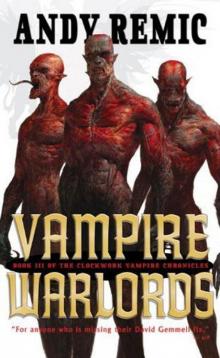 Vampire Warlords: The Clockwork Vampire Chronicles, Book 3
Vampire Warlords: The Clockwork Vampire Chronicles, Book 3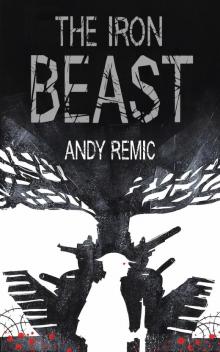 The Iron Beast
The Iron Beast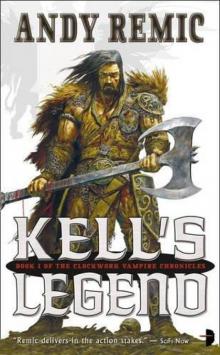 Kell's Legend
Kell's Legend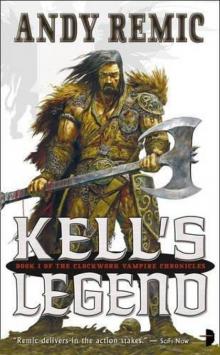 Kell’s Legend cvc-1
Kell’s Legend cvc-1 The Dragon Engine
The Dragon Engine Biohell
Biohell Sim
Sim Soul Stealers
Soul Stealers Warhead
Warhead The Iron Wolves
The Iron Wolves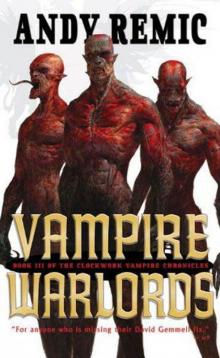 Vampire Warlords cwc-3
Vampire Warlords cwc-3 Serial Killers Incorporated
Serial Killers Incorporated Hardcore - 03
Hardcore - 03 Twilight of the Dragons
Twilight of the Dragons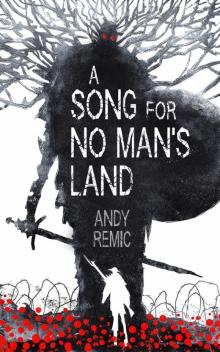 A Song for No Man's Land
A Song for No Man's Land Toxicity
Toxicity War Machine (The Combat-K Series)
War Machine (The Combat-K Series) The White Towers
The White Towers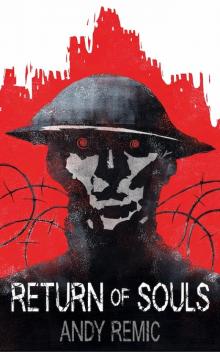 Return of Souls
Return of Souls Theme Planet
Theme Planet Cloneworld - 04
Cloneworld - 04 Soul Stealers cvc-2
Soul Stealers cvc-2 Spiral
Spiral Quake
Quake